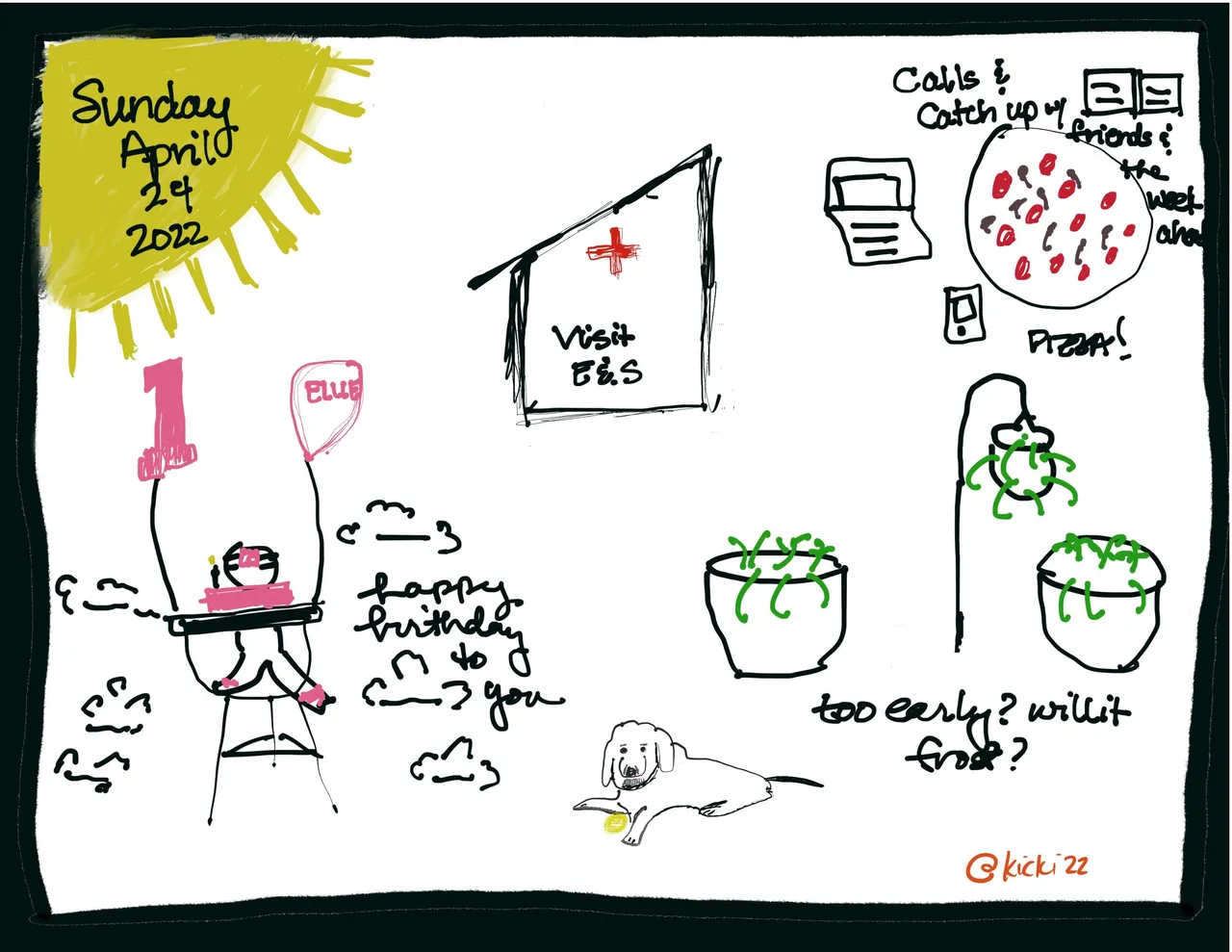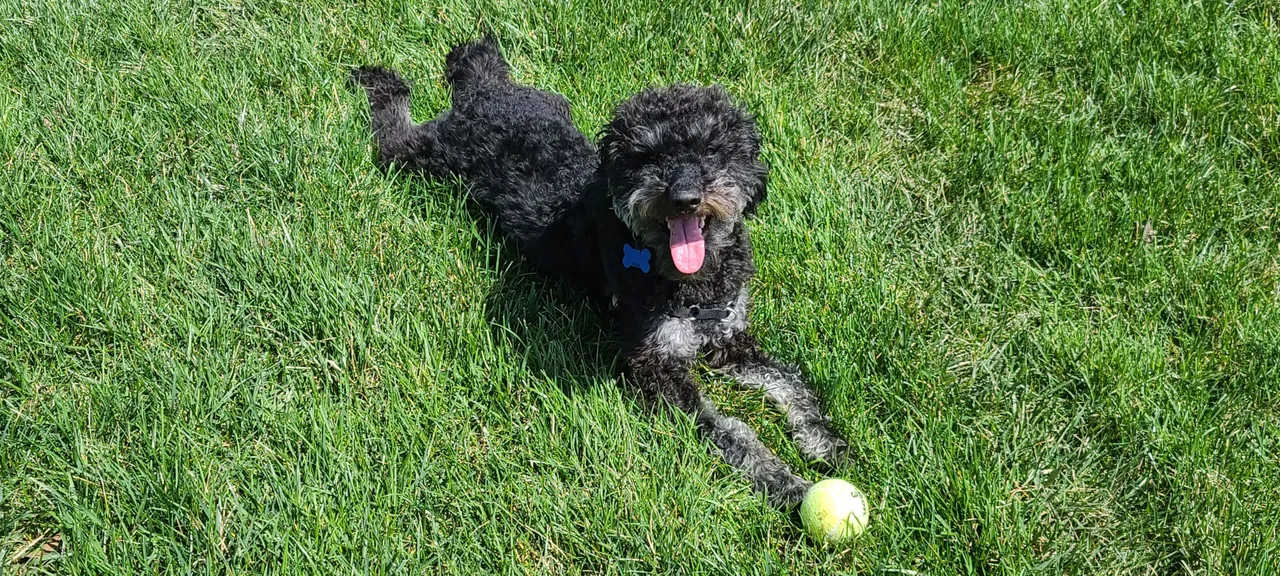From April 23 to May 22, I'm posting a hand drawn visual every day on Twitter. I would generally describe myself as someone who can't draw. That said, I want to develop my visual thinking skills and drawing skills. The only way to get better at something is to practice - and so I'll just share my practice, no matter how bad I think it might be with the world via the Internet.

The image above is my posting from April 24 which you can see on Twitter in its original form here. It's essentially a visual journal entry showing what I did that day.
Let's dive into some of the reasons why you might want to explore visual thinking more as well.
We're too wordy
Trust me that I understand the irony of writing a long form piece about being too wordy. That said, we are entirely too wordy. And, our wordiness can get in the way of meaning. In his excellent book "Blah, Blah, Blah", author Dan Roam identifies the wordiness components of what he calls the Blah-Blahmeter. My restatement of Roan's three factors that form the first level of the Blah-Blahmeter are:
- Is it boring?
- Is it clear? Remember - clarity requires two parts - knowing your audience and their ability to understand the message combined with your ability to deliver that message.
- Is it intentionally misleading? Roam uses the example of a speech by Bernie Madoff - of the $21 Billion Dollar Ponzi Investment Scheme. Excellent example of intentionally misleading as many people as humanly possible with ill intent.
Roam goes into even more detail about his Blah-blahmeter in the book but also says that this first level is a good filter for taking in the words of others. I'd also say it's a good filter for our own words as well.
I love Roam's approach because he is certainly not advocating stopping use of words. Instead, he both expresses appreciation for the importance of words and he continuously reminds of the importance of using words well. This is one of my favorite quotes of Roam's on the use of words:
Words can do all these wonderful things because language is the single most sophisticated, finely developed, and important technology humanity has ever created. Using words is what makes us human.
But using words and using words well are not the same thing. That's because, wonderful as the technology of language is, it is also our easiest technology to mess up. (Page 28 of "Blah, Blah, Blah" by Dan Roam, emphasis mine)
One of the most common places my wordiness gets me in trouble is with my dog Kona.

Kona is shown here with the object of his affection - his ball.
Our beloved trainer Mike has to remind me regularly (usually through messages posted to my Facebook videos of me carrying on long conversations with Kona) that the dog understands plain, simple cues. He does not understand long paragraphs.
Case in point...He has no idea what I'm saying if I say, "Where did your ball go? Is it under the cabinet again?". On the other hand, ask him, "Where's ball?" and within a moment or two he's very likely to go sit next to the piece of furniture that has again eaten his prized toy. Plain, simple messages get the point across.
In her book, "How Stella Learned to Talk", human speech pathologist Christina Hunger shares how she has enabled her dog Stella to respond to simple questions and to communicate simple thoughts at any time she wishes using programmable buttons.
Kona and I haven't invested in the programmable buttons - mostly because he's quite capable of communicating his wants and needs clearly without them due to the rhythms and cycles of our day and home.
- Want out to play? He sits by the door and "talks".
- Hungry? Sit by the laundry room door (where his food is).
- Thirsty? Sit by the bedroom door (where his water bowl is). This one also sometimes involves a bit of "talking".
- Need to potty? Also sits by the door, but there is a different "phrasing" to his talking - more whine than play growl/bark.
One of my favorite things is that Kona also knows the names of several toys. Our most favorite toys - Slothy, Dinky (a pink dragon), Ball, Bone, and Lemur are all retrieved almost perfectly on command. I didn't do anything intentional to teach him this other than using the names of the toys each time he brought them to me.
Fewer words aren't just good for dogs. In a recent episode (episode 256) of one of my favorite podcasts, Happier in Hollywood, television show runners of the current reboot of Fantasy Island - Liz Craft and Sarah Fain - share how they often edit their scripts down to the essence - a sentence like "She crosses the room and takes a seat on the couch" could just be "she sits". They used that example in the podcast here and I'm restating it for exemplar purposes but you can listen to their other tips in the episode.
Liz and Sarah also talk in that episode about how they are fans of white space on a script page. If I click onto a web page that is nothing but a wall of text - or open up a PDF of a report that is nothing but paragraph after paragraph, my shoulders slump and I simply don't want to start reading if I don't have the energy to dive in and figure out whether or not I can trust what's being said here.
Words don't just confuse dogs. They often completely leave people out
In her beautiful course, Pencil Pirates, visual artist and facilitator Laura Evans reminds us that words only speak to one language - the one they are written in. Yet, we are a world of around 7100 different languages. When we all come together, we need pictures to help us communicate clearly.
One of my favorite moments of the 202[1] Tokyo Olympic Opening Ceremonies was a celebration of the Olympic Pictograms. These pictograms are a visual iconography language designed to help the world's population navigate the events of the Olympic Games. You can watch that portion of those opening ceremonies on YouTube. They were first developed for the first Tokyo games since the games were being held in Japan - a country with a language that the majority of the world doesn't speak.
Words in different languages often have different subtleties. Brene Brown's most recent book (as of the original writing of this post), will only be available in English. Brown studied 87 emotions and experiences based on the English word for them. If these were translated into other languages, meaning would be lost or unintentionally added because words are not equal from language to language. It's also interesting that researchers don't agree on the what the definition of emotion is and hence, Brown calls them emotions and experiences.
We have universal languages in things like mathematics and music. Iconography and images are yet another universal language that we should all undertake learning more about.
My learning plan
I will confess at this point (since you've invested this much time in my words, surely you'll finish reading this) that I WANT to be artistic. And while I wish I could simply wake up one morning and be confident and comfortable drawing more than simple block shapes and stick figures - that is, in fact, where I am starting from.
I have nothing but room to grow from - apart from a strong desire to improve my visual thinking skills which I already have. So, what is my learning plan?
- In addition to posting my sketch each day on Twitter - holding myself publicly accountable - I am taking Laura's lovely Pencil Pirates course noted above. A cohort begins in May 2022 - come join the fun with me.
- I am reading Dan Roam's Blah, Blah, Blah as well as his backlist of titles.
- I am dusting off my copy of the Sketchnote Handbook by Mike Rohde. I'm attending a conference in New York City soon. My daily sketches will be conference session sketchnotes from one or more sessions I attend at that conference.
- I'm using Skillshare and other online sites to learn Procreate. I love paper and pen but pro-create adds the convenience of digital. Procreate also lets me use tracing shapes and some other cool tricks to make my drawings look even better than my skill level would say they can be.
Some thought starters from this article I'd love to know your thoughts on
- What would you like to learn next?
- How do you approach learning a new skill even when you feel really bad at it? How do you maintain your motivation?
- When have words failed you?
- When have fewer words served you well?